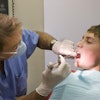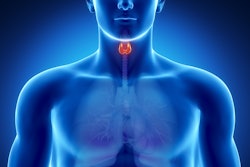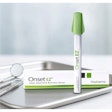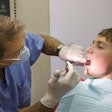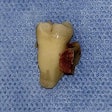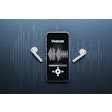Epinephrine is an essential tool in dental care, playing a critical role in pain management and procedural control. Most commonly, we use it to enhance the duration of local anesthesia, decrease systemic absorption, and minimize bleeding by vasoconstriction. This allows for more extended and controlled procedures with fewer complications.
Pharmacologically, epinephrine works by stimulating various adrenergic receptors. This results in vasoconstriction, increased heart rate, and relaxed airways. In dentistry, vasoconstriction is particularly useful because it helps concentrate the anesthetic in the desired area, preventing it from diffusing too quickly and thus extending its effects. This not only enhances pain control but also reduces the risk of systemic toxicity.
 Teresa Mendoza, PharmD.
Teresa Mendoza, PharmD.
However, epinephrine must be used with caution, especially in patients with certain medical conditions. Patients with cardiac arrhythmias or cardiovascular diseases such as hypertension or ischemic heart disease may be at higher risk of complications. Similarly, patients on beta blockers pose an additional layer of complexity due to the potential for adverse cardiovascular interactions.
Understanding beta blockers and their impact on epinephrine
 Barbara Madej, RPh.
Barbara Madej, RPh.
When a patient is taking beta blockers, the dynamics of how epinephrine works in the body can change significantly. Knowing the differences between the different types of beta blockers is crucial for minimizing risks.
| Beta blocker type | Mechanism | Uses | Examples | Interactions with epinephrine | Other considerations |
|---|---|---|---|---|---|
| Selective | Primarily blocks beta-1 receptors, which are mainly found in the heart | Treats high blood pressure and heart failure Prevents heart attacks |
Atenolol Bisoprolol Metoprolol |
Increased heart rate Elevated blood pressure Cardiac arrhythmia Anxiety or nervousness Reduced beta blocker efficacy |
Be aware of potential interactions and monitor the patient. |
| Nonselective | Blocks both beta-1 and beta-2 receptors, affecting not only the heart but also the lungs and peripheral blood vessels | Treats high blood pressure, heart failure, and anxiety Prevents heart attacks and migraines |
Propranolol Nadolol Carvedilol |
Severe hypertension Bradycardia Cardiac arrhythmias Respiratory issues Anxiety or nervousness Reduced local anesthetic efficacy In rare cases, cardiac or stroke, particularly at higher doses of epinephrine |
It is essential to use the lowest possible dose of epinephrine and monitor the patient closely. |
| Intrinsic sympathomimetic activity (ISA) | Partially stimulates beta receptors while also blocking them, leading to a "gentler" effect on the heart | Used in patients who need blood pressure control but also have a slower heart rate or other specific conditions | Pindolol Acebutolol |
Cardiac arrhythmias Hypertensive crisis |
Be aware of potential interactions and monitor the patient. |
 Dr. Lisa Chan.
Dr. Lisa Chan.
While the doses of epinephrine used in dentistry are generally low, it's still critical to take a thorough medical history and assess all potential risk factors, including other medications, before administering it.
A proactive approach to safer dentistry
Although dramatic life-or-death moments are relatively rare, staying on top of potential drug interactions is essential to ensure patients' safety. Resources like the Digital Drug Handbook can be your go-to for checking interactions in real time, helping you deliver care that's not just efficient but safe too.
So, let's stay informed, stay cautious, and, most importantly, let's end smile denial because nothing beats the satisfaction of a smooth, safe procedure that leaves our patients feeling confident in their care.
Teresa Mendoza, PharmD, received her degree in biochemistry and a minor in Chicano/a studies from the University of California, Los Angeles (UCLA). She earned her Doctor of Pharmacy degree from the University of California, San Francisco School of Pharmacy. Mendoza has held many executive positions involving service to the community and higher education advocacy. She is a contributor to MedAssent DDS as a medical/pharmaceutical communications specialist, where she leads the blog, white paper, and continuing education content.
Barbara Madej, RPh, is a licensed pharmacist who has dedicated her life to serving her home country of Canada, as well as her new home of Los Angeles, after receiving her degree in pharmacy from the University of Saskatchewan. Madej co-founded MedAssent Rx in 2015, drawing from her decades of experience in pharmacy and putting her passion to action.
Dr. Lisa Chan has devoted her career to promoting equity in care in both dentistry and her community. She brings over 35 years of diverse experience in dentistry to her role. Chan received her Doctor of Dental Surgery degree from the University of Southern California Herman Ostrow School of Dentistry. Her background includes significant positions such as a hospital dentist at Kaiser Permanente, a private practice dentist in Los Angeles, and a consultant for the California State Dental Board. Chan co-founded MedAssent DDS with the mission of elevating patient safety through integrated care.
The comments and observations expressed herein do not necessarily reflect the opinions of DrBicuspid.com, nor should they be construed as an endorsement or admonishment of any particular idea, vendor, or organization.



